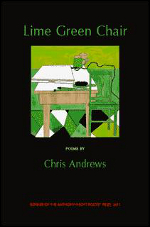
Lime Green Chair by Chris Andrews
The Waywiser Press, 2012
In a recent article published in Sydney Review of Books, Emmett Stinson argues that Australian reviewers’ and readers’ responses to Australian short story collections are regulated by the receptions of these authors in the US. And so, according to Stinson, the so-called cultural cringe lives on. But is this really the case? And should we really be suspicious of internationally recognised Australian writers such as Chris Andrews whose second collection of poems has been published by Baltimore’s Waywiser Press, the publishers of such giants of US poetry as Anthony Hecht, Richard Wilbur and W. D. Snodgrass?
It would be rather easy to portray Newcastle-born, Sydney-based Andrews as an annoyingly overachieving, tall poppy. In addition to having had his English translations of some of Latin America’s major modern writers such as Roberto Bolaño and César Aira published by New York’s legendary New Directions, he has received the British Society of Authors’ Prize for Literary Translation from Spanish. Andrew’s command of a number of European languages and unabashed cosmopolitanism alone should be enough to evoke the ire of many an anti-cultural cringe warrior. And the fact that Lime Green Chair includes some of the most original and masterful poems written by an Australian poet will no doubt see him accused of ‘aesthetic conservatism’ or some such by peddlers of the tall poppy syndrome.
It would be a rather objective observation to point out the technical mastery of Andrews’ 21-line, 231-syllable poems, which constitute the entirety of the first and final sections of his book. These comprise carefully measured hendecasyllabic lines – a meter used most rigorously by early Italian poets – that make for a taut, gripping rhythm. In the poem ‘If I Start’, for example, the informal and subtly witty voice of the speaker lures the reader, but it’s the consistent syllabic measurement which carries the reader along even when the first-person speaker disappears amidst a more ornate, imagistic language:
I remember telling my future self, Don’t start thinking these were the best days of your life or I’ll disown you. I remember the wind, still chilly but not unkind, stripping blossom out of rain-laden plum tree and bustling the black end of an apricot storm away while citrus sidelight put a fugitive glow into bricks and tiles and gave wet bitumen sparkling relief ...
I would be reluctant to label Andrews a lyric poet, since the discipline and effective rigidity of his writing precludes the kind of emotive expressivity one often associates with lyricism. Nevertheless, his tightly structured and synchronised poems are further additions to the ongoing revival of formalism in contemporary poetry, even if he is far too intelligent and sophisticated a writer to use form as a mere vehicle for unexamined, egoistical utterances. Consider the seamless yet playful integration of a quotation by the great Walter Benjamin in the following poem (‘The Same Party’) where, amidst the satirical depiction of an explicitly boring party:
The pianist transposed it up an octave. Axiological differences were aired: That is such a bad song. But as someone said: “Boredom is the dream bird that hatches the egg of experience,” and the boringest bore of all is bored bore.













